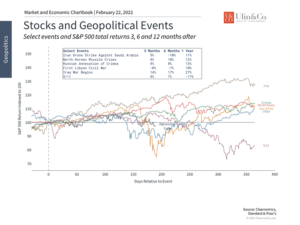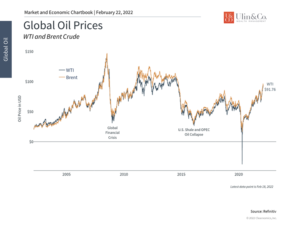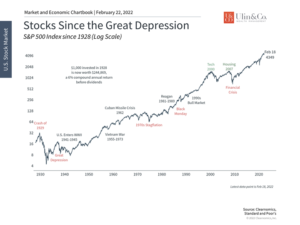How to Invest Through the Russia-Ukraine War
Russia-Ukraine “world-war” news can be a wee-bit unsettling for investors of all ages while the world is still digging out from the 2020 COVID19 pandemic-led recession.
There are over 270 million search results this week on “will Russia/ Ukraine war affect stocks” with many investing articles pointing out that the S&P 500 was near correction territory (down 10%+), with many sectors from small cap growth to tech in a bear market (down 20%+) year to date before the invasion began. Just with the Nasdaq Composite, a third of the stocks are down near 30% for the year.
For long-term investors, facing periods of geopolitical risk is unavoidable. Headlines on global conflicts can be alarming since they are unlike the typical flow of typical business and market news. These events are also difficult to analyze and their outcomes challenging to predict. Of course, this doesn’t stop many short-term traders from talking about “buying the invasion,” betting on oil prices like Vegas and trying to time the market, nor does it stop market strategists from making bold predictions on how the S&P 500 might react.
Keep Your Brain in the Game
While this time is always different, Disciplined, experienced investors know that by focusing less on emotions and more on process when major events occur can better increase their odds of success over time in the markets. You should not feel any more “delight” or “smarter” when the market is up 15%, than feeling “depressed” or “ignorant” when the market is down 15%.
Jon here. Our clients recognize the concept of utilizing diversification to help maintain smother returns over time, and know they are not heavily weighted in the NASDAQ or the DJIA “headline news” indices. We have received a few recent calls from clients seeking to “get new cash to work” for them this week, which is manifestation of the Buffet maxim to “by when others are fearful.”
When playing blackjack, you have four options: Hit, Stand, Double-down, Split. Just the same when reacting to extreme stock market volatility, you can have a few responses such as (1) sell: cash out your hand (2) hit: buy more stocks (3) stand: do nothing and sit out the round. Generally, the worse decision is selling and the best decision may be doing nothing. Regardless of your IQ age or occupation, these thoughts may cross your mind at some point when stocks are falling and the VIX (fear index) is skyrocketing.
In terrible times like war, stock market swings are expected, with extreme panic selloffs driven in part by quant-driven algorithms in as much as humans, while creating a vicious cycle. Over the past two decades there have been numerous incidents that rattled the markets, but many times for only for a matter of months as we experienced with the 2020 pandemic-driven crash, a man-made recession and “V’ shaped recovery.
Impact of War on Investors
On the surface, Russia is asserting its claim to the Russian-controlled regions of Donetsk and Luhansk, with their forces now entering after weeks of build-up and intelligence warnings. The U.S., Europe and NATO allies have responded with sanctions thus far, and Germany has also placed approval of the Nord Stream 2 pipeline, which would carry Russian natural gas, on hold. In reality, the true motivation for Russia goes beyond these two statelets and involves decades of tensions since the end of the Cold War.
The current situation adds to the many geopolitical crises this century that have been intertwined with business cycles. These include: the attacks on September 11, the war in Iraq, the so-called Arab Spring, Russia’s 2014 annexation of Crimea, periodic North Korean missile crises, tensions between China and the U.S., the U.S.’s exit from Afghanistan last year, and many more. While each of these episodes is geopolitically impactful, especially when there are humanitarian consequences, this does not always mean there are consequences for long-term portfolios.
This is because, while markets may react to a variety of news on a daily and weekly basis, what drives portfolios over years and decades is quite different. Over longer periods of time, slow and steady economic growth, corporate performance, and valuations matter much more. (see below) This was true during the conflicts mentioned above as well as in the decades following World War II and during the Cold War when there were several long bull markets.
Some events such as 9/11 and the wars in Iraq and Afghanistan that followed were certainly met with market declines. However, these pullbacks coincided with the dot-com crash which was entirely unrelated. Conversely, the various conflicts since the 2010’s including multiple civil wars in the Middle East, Crimea, and the on-going nuclear threats in North Korea and Iran, were against a backdrop of a strong economic cycle.
While there was occasionally short-term market uncertainty, the business cycle is ultimately what drove stock returns. The history of the 20th century across World War II, the Vietnam War, and the Cold War only further underscore this point. Today’s headlines are occurring during a strong economic expansion and just as the market is reacting to the Fed’s imminent rate liftoff.
Oil Quagmire
Energy prices can be affected by these conflicts since they have tended to involve oil and gas producing regions. This is true today with energy prices rising steadily as Brent crude is near $100 per barrel. (see below) As a member of OPEC+, Russia is an important supplier of oil and natural gas to many parts of the world, notably Europe. It’s also quite the quagmire that the 2021 imports of Russian oil to the United States hit their highest level in a decade to become the second-largest exporter of oil to the USA. This could take a direct toll on the US consumer now that the USA is not energy independent, but you never know.
That said, energy prices (and gas at the pump) had already been rising steadily throughout the pandemic recovery and in response to lower-than-expected OPEC+ production. During the 2014 episode in Crimea, there was little direct impact on oil, and even the 2019 drone strikes against Saudi Aramco by Iran and others, which knocked out 5% of global oil production overnight, saw only a short-lived reaction in oil markets. Thus, the direction of energy prices can be difficult to predict.
Of course, energy, the economy and cash flows are not the only factors that affect stock prices. Markets depend on global stability, the rule of law across regions, and business/consumer confidence. Regional conflicts that could involve the United States and its allies can increase the “risk premium” or “discount rate,” to use finance terminology. In theory, even if corporate profits and cash flows are unaffected, the possibility that they could be affected is enough to hurt investor confidence and stock prices. After all, if the world does destabilize, cash today is worth much more than the promise of cash far out into the future.
As we continually discuss in our newsletters, history shows that it’s a mistake to make dramatic shifts in portfolios in response to geopolitical crises. Properly diversified portfolios, especially those built around long-term financial plans by a trusted advisor, are designed to handle these periods of uncertainty. It’s always the case that markets can swing wildly at any moment, whether it’s due to wars, economic shocks, financial crises, pandemics, and more.
None of this is to dismiss the severity of the current situation in Ukraine from a geopolitical, humanitarian, or regional economic perspective. While these issues will be closely watched, investors ought to avoid passing judgment with their portfolios. Instead, investors should consider these events in a broader economic and market context. Below are three charts that help provide perspective on how geopolitical events affect investors.
1 Geopolitical events can startle markets in the short run
The history of geopolitics and the stock market is mixed. In the long run, markets tend to recover and perform well, primarily because business cycles are what matter over years and decades. In cases like 9/11 and the ensuing wars, markets were down because of bear market conditions already in place.
2 Oil prices have been climbing throughout the recovery
Oil prices have been recovering steadily since they collapsed at the start of the pandemic. While regional conflicts can affect energy prices, history shows that this is neither guaranteed nor are there always long-lasting effects.
3 The stock market has grown despite a century of major conflicts
The past century witnessed several major global conflicts including World War II, the Vietnam War, and the on-going tensions of the Cold War. Throughout these periods, the economy and stock market were able to grow steadily. For long-term investors, overreacting to these events would have been the wrong move.
The bottom line? Geopolitical risk is unavoidable when investing over the long run. Investors should stay level-headed and hold balanced portfolios to navigate through the months ahead through the Russia/Ukraine War.
For more information on our firm or to get in touch with Jon Ulin, CFP®, please call us at (561) 210-7887 or email jon.ulin@ulinwealth.com.
You cannot invest directly in an index. Past performance is no guarantee of future returns. Diversification does not ensure a profit or guarantee against loss. All examples and charts shown are hypothetical used for illustrative purposes only and do not represent any actual investment. The information given herein is taken from sources that IFP Advisors, LLC, dba Independent Financial Partners (IFP), and it advisors believe to be reliable, but it is not guaranteed by us as to accuracy or completeness. This is for informational purposes only and in no event should be construed as an offer to sell or solicitation of an offer to buy any securities or products. Please consult your tax and/or legal advisor before implementing any tax and/or legal related strategies mentioned in this publication as IFP does not provide tax and/or legal advice. Opinions expressed are subject to change without notice and do not take into account the particular investment objectives, financial situation, or needs of individual investors.
Investment advice offered through IFP Advisors, LLC, dba Independent Financial Partners (IFP), a Registered Investment Adviser. IFP and Ulin & Co. Wealth Management are not affiliated.







